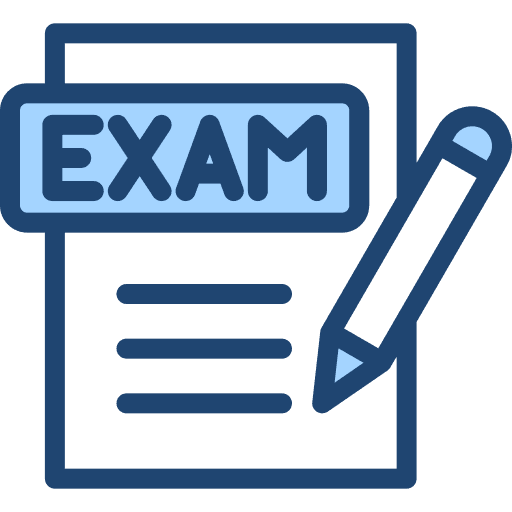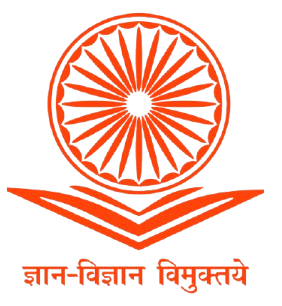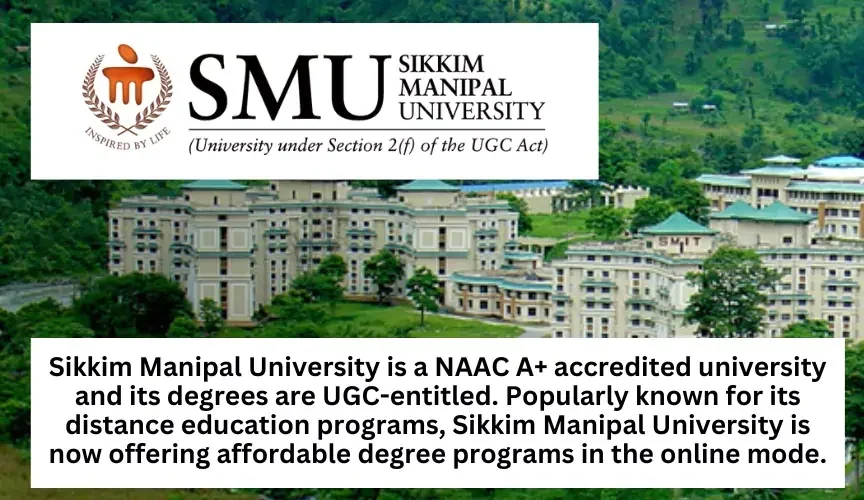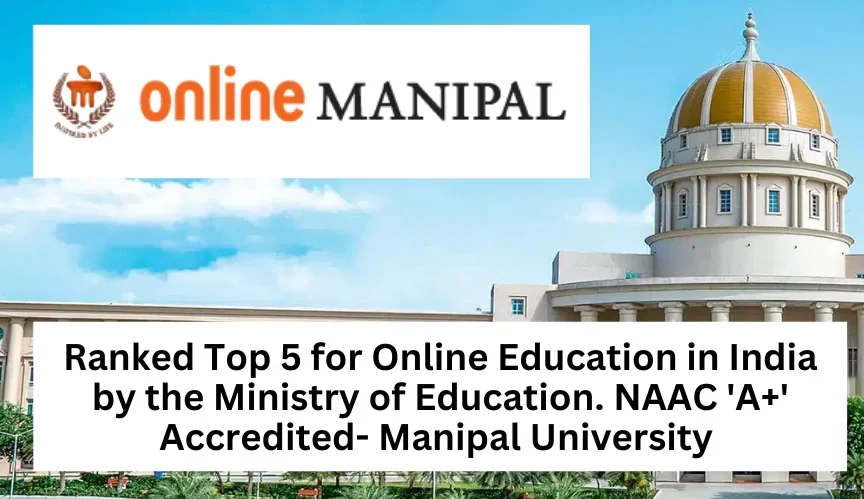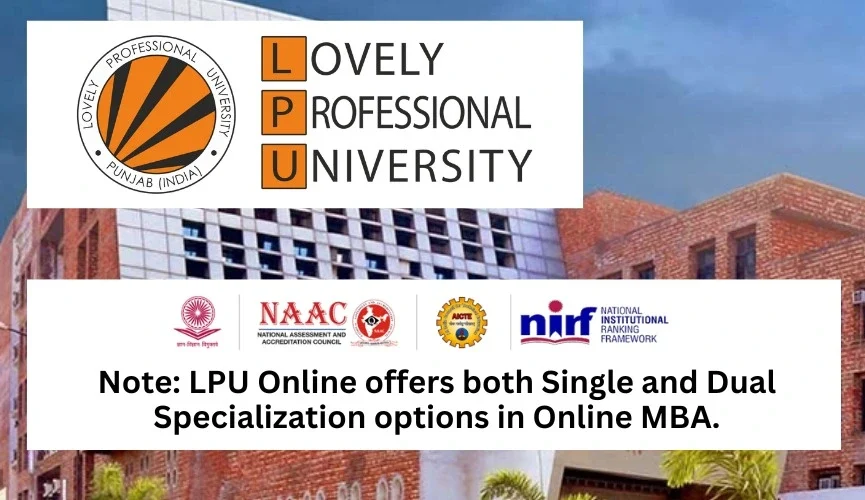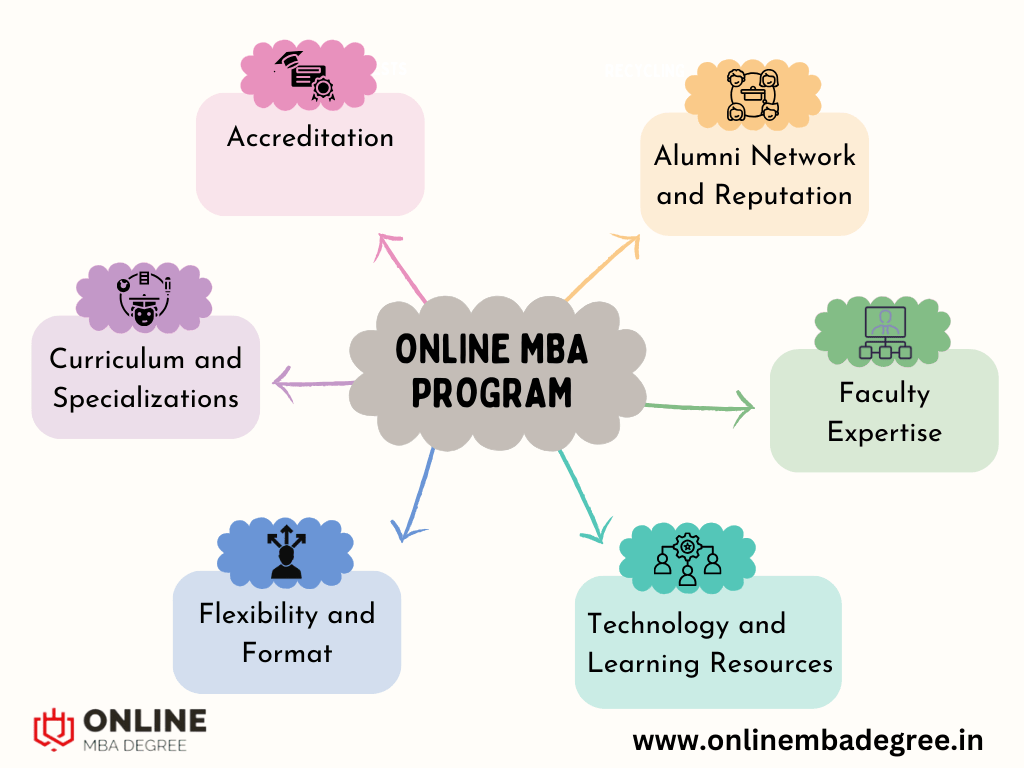UGC Announces Admissions in Two Academic Session 1st Batch(July/August) . 2nd Batch (January/February)
Get an Online MBA Degree by NAAC A++ Accredited Universities
Globally Recognised Universities
As per Govt. Online MBA Degree are Now Equivalent to Regular Degrees
Hurry Up! Admission Closing Soon. Only Few Seats Left. Enroll Now!
ODL & Online MBA Programs are Equivalent to Regular (Campus) Programs - To know more
UGC Announces Admissions in Two Academic Session 1st Batch(July/August) . 2nd Batch (January/February)
Get an Online MBA Degree by NAAC A++ Accredited Universities
Globally Recognised Universities
As per Govt. Online MBA Degree are Now Equivalent to Regular Degrees
Hurry Up! Admission Closing Soon. Only Few Seats Left. Enroll Now!
ODL & Online MBA Programs are Equivalent to Regular (Campus) Programs - To know more

New Education Policy 2025: Government of India
The New Education Policy (NEP) 2025 marks a significant shift in India’s education system, replacing the traditional 10+2 structure with a 5+3+3+4 framework. This reform aims to create a more flexible, skill-oriented, and inclusive learning environment that aligns with global education standards. By integrating foundational learning, vocational training, and technology-driven education, the policy envisions preparing students for 21st-century challenges.
The 5+3+3+4 model restructures the schooling system to cater to different cognitive development stages of children, ensuring a gradual and holistic progression in learning. This approach places greater emphasis on experiential learning, interdisciplinary education, and skill development, paving the way for a competency-based education system.
Breakdown of the 5+3+3+4 Structure
- Foundational Stage 2(5 years) – Ages 3 to 8 years (Pre-school to Grade 2)
- Includes three years of pre-primary education (Anganwadi, Balvatika, Kindergarten) and two years of early primary schooling (Grades 1 and 2).
- Focuses on play-based, activity-based, and experiential learning to nurture curiosity and creativity in young minds.
- Develops cognitive, social, emotional, and motor skills through storytelling, music, art, and interactive play.
- Emphasizes early literacy and numeracy skills, laying the foundation for lifelong learning.
- Preparatory Stage (3 years) – Ages 8 to 11 years (Grades 3 to 5)
- Transition from informal learning to structured subject-based learning.
- Focus on foundational literacy and numeracy to strengthen reading, writing, and arithmetic skills.
- Introduction to subjects such as language, mathematics, science, social sciences, and arts in a more engaging and interactive manner.
- Encourages multilingual education, with emphasis on the mother tongue or regional language as a medium of instruction.
- Use of technology, storytelling, and real-world examples to make learning more application-based.
- Middle Stage (3 years) – Ages 11 to 14 years (Grades 6 to 8)
- Introduction of abstract and interdisciplinary subjects, encouraging analytical and critical thinking.
- Emphasis on experiential learning through projects, experiments, coding, and hands-on activities.
- Exposure to vocational education and skill-based training, including crafts, music, arts, and practical sciences.
- Integration of STEAM education (Science, Technology, Engineering, Arts, and Mathematics) to foster innovation and problem-solving abilities.
- Introduction of digital learning tools, computational thinking, and AI concepts.
- Secondary Stage (4 years) – Ages 14 to 18 years (Grades 9 to 12)
- A multi-disciplinary approach with the flexibility to choose subjects across various domains, including sciences, commerce, humanities, and vocational studies.
- Focus on higher-order thinking skills, entrepreneurship, financial literacy, and industry-relevant knowledge.
- Introduction of modular board examinations with competency-based assessments rather than rote learning.
- Promotion of internships, apprenticeships, and real-world exposure to prepare students for careers and higher education.
- Strong integration of digital platforms, research projects, and collaboration with industry experts.
Importance of NEP 2025 in MBA Education
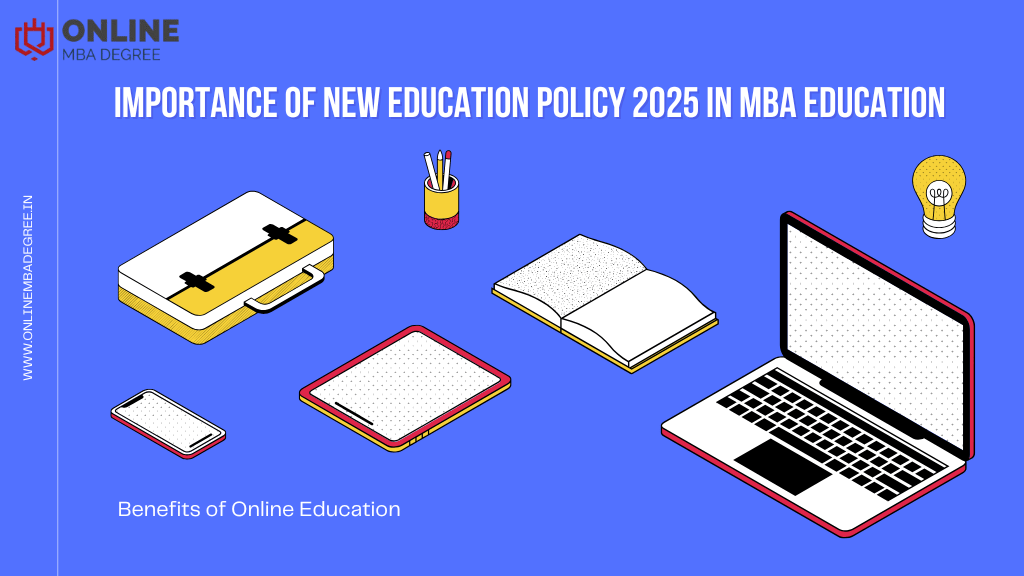
The New Education Policy 2025 plays a crucial role in shaping the future workforce, directly impacting MBA education and business professionals. The policy introduces multi-disciplinary learning, vocational training, and technology-driven education, which align with the skills required in the corporate world.
- Enhanced Leadership and Problem-Solving Skills: The focus on experiential and critical thinking-based learning in schools ensures that students develop strong analytical and leadership abilities from an early age.
- Industry-Relevant Skill Development: Early exposure to entrepreneurship, digital skills, financial literacy, and vocational training prepares students for managerial roles and business strategy development.
- Flexibility in Education: The ability to choose subjects across multiple disciplines ensures that future MBA aspirants are well-versed in business, technology, and analytics, creating a holistic approach to management education.
- Global Competency: The NEP’s emphasis on coding, AI, digital transformation, and research-based learning helps MBA graduates stay ahead in the global business landscape.
- Stronger Entrepreneurial Mindset: By fostering innovation and hands-on project experience, the NEP 2025 nurtures an entrepreneurial mindset, essential for business leaders and startup founders.
Key Benefits of the NEP 2025 Framework
1. Skill-Oriented Approach
The NEP 2025 shifts the focus from rote learning to a competency-based, skill-driven education system. By encouraging entrepreneurial thinking, problem-solving, and creativity, the policy ensures that students develop the necessary cognitive and analytical abilities to thrive in dynamic work environments. This approach fosters an innovation-driven mindset, preparing students for real-world challenges and enhancing their decision-making and leadership skills—critical for business, technology, and research-oriented careers.
2. Flexibility in Learning
Breaking away from the traditional rigid subject streams, the policy introduces a multi-disciplinary approach, allowing students to explore diverse academic and professional interests. This means a student interested in economics and data science or business and psychology can now seamlessly integrate these subjects into their curriculum. This flexibility not only enhances personalized learning but also empowers students to pursue careers aligned with their passion and strengths, fostering a workforce that is both skilled and well-rounded.
3. Technology Integration
With the rise of the digital economy, NEP 2025 places a strong emphasis on technological proficiency by incorporating AI, data science, blockchain, and coding into early education. Digital learning tools, interactive AI-driven platforms, and exposure to virtual simulations will make education more engaging, accessible, and future-ready. This early adoption of technology ensures that students stay ahead in an era of automation and digital transformation, equipping them with essential digital literacy and computational thinking skills.
4. Vocational Training and Experiential Learning
Recognizing the importance of practical, hands-on education, the framework integrates vocational training from middle school, enabling students to gain industry-relevant experience at an early stage. By blending internships, apprenticeships, and project-based learning, students develop job-ready skills in areas like manufacturing, design, finance, and digital marketing. This shift ensures that students graduate with both theoretical knowledge and practical expertise, reducing the skill gap between academia and industry.
5. Global Competitiveness and 21st-Century Skills
NEP 2025 aims to equip students with global competencies, ensuring they are prepared for higher education and professional careers in an increasingly interconnected world. By integrating critical thinking, communication, collaboration, and adaptability, the policy enhances students’ problem-solving abilities and global awareness. With an emphasis on multilingualism, international collaborations, and cross-cultural exposure, Indian students will be better positioned to compete in global academic and corporate landscapes, fostering a workforce that is innovative, diverse, and globally competitive.
Implications for MBA Aspirants and Professionals
The National Education Policy (NEP) 2025 fosters a workforce that is adaptive, innovative, and skilled in digital transformation, aligning with the rapidly evolving business landscape. As industries undergo technological disruptions and the demand for multi-disciplinary expertise rises, MBA graduates will emerge from an education system that is future-focused, holistic, and globally competitive.
1. Technological Proficiency and Entrepreneurial Mindset
One of the major benefits for MBA aspirants is the development of a talent pool that is technologically proficient, entrepreneurial, and adaptable. The integration of AI, data analytics, sustainability, and leadership skills into mainstream education will equip future business leaders with critical thinking abilities, problem-solving expertise, and digital fluency—all essential for navigating the complexities of the modern corporate world.
2. Global Alignment and Industry Readiness
The 5+3+3+4 education structure represents a paradigm shift toward a system that is aligned with global benchmarks and tailored to industry demands. This approach ensures that students are exposed to interdisciplinary learning, experiential education, and skill-based training from an early stage, fostering an ecosystem of innovation and entrepreneurship. For MBA professionals, this means a workforce that is not only academically strong but also industry-ready, capable of addressing real-world business challenges with agility and strategic foresight.
3. Lifelong Learning and Continuous Upskilling
Additionally, NEP 2025 promotes lifelong learning, continuous upskilling, and a dynamic approach to professional growth. With a greater emphasis on flexible learning pathways, digital education, and vocational training, business professionals will have access to diverse learning opportunities, enabling them to stay competitive in an era of rapid technological and economic transformation.
NEP 2025 and the Changing Role of Educators
The National Education Policy (NEP) 2025 brings a paradigm shift in the role of educators, transforming them from traditional instructors into facilitators of knowledge, mentors, and learning experience designers. The emphasis on experiential, interdisciplinary, and competency-based learning requires teachers to adopt modern pedagogical approaches and leverage cutting-edge educational technologies to ensure students develop critical thinking, problem-solving, and real-world application skills.
Transition from Instructors to Facilitators
Under NEP 2025, educators will no longer be passive deliverers of content but will actively engage students through dynamic, participatory, and inquiry-driven learning methods. This transition involves:
- Encouraging Active Learning: Moving away from rote memorization to discussions, debates, and collaborative problem-solving.
- Providing Hands-on Experiences: Facilitating real-world case studies, simulations, and industry-linked projects.
- Mentoring and Guidance: Acting as career mentors and skill developers rather than just subject matter experts.
- Developing Critical Thinking and Analytical Skills: Encouraging students to question, explore, and innovate through inquiry-based learning.
Integration of Project-Based and Experiential Learning
NEP 2025 prioritizes experiential learning, making it an essential part of the teaching-learning process. Educators will be responsible for:
- Incorporating Real-Life Applications: Designing lessons that connect theory with real-world scenarios, making learning more relevant and impactful.
- Facilitating Group Projects and Collaborative Learning: Encouraging teamwork and communication through peer-to-peer discussions, problem-solving exercises, and group research projects.
- Encouraging Hands-on Learning: Engaging students in labs, fieldwork, internships, and community-based learning experiences.
- Promoting Entrepreneurship and Innovation: Guiding students to design solutions, develop business models, and engage in start-up incubation programs.
Leveraging AI-Powered Teaching Tools and Adaptive Learning Technologies
With the integration of Artificial Intelligence (AI) and EdTech in education, teachers will need to incorporate technology-driven methodologies into their teaching strategies. This includes:
- Personalized Learning Paths: AI-driven platforms can analyze students’ progress and adapt lessons to individual needs.
- Smart Classrooms: Using virtual labs, augmented reality (AR), and gamification to make lessons more engaging.
- AI-Enabled Assessment Tools: Automating grading, feedback, and progress tracking to focus on holistic student development.
- Intelligent Tutoring Systems: AI-powered chatbots and virtual tutors can assist students with homework, problem-solving, and exam preparation.
Personalized Learning Experiences Using Data Analytics
The NEP 2025 framework encourages a student-centric approach, where educators use data-driven insights to enhance learning outcomes. Key strategies include:
- Adaptive Curriculum Design: Using student performance analytics to tailor learning modules based on strengths and weaknesses.
- Real-Time Progress Monitoring: Teachers will leverage learning analytics platforms to identify students who need extra attention.
- Customized Learning Materials: Creating personalized digital content based on individual learning styles and preferences.
- Gamification & Interactive Learning: Using quizzes, AI-powered simulations, and interactive modules to engage students effectively.
Continuous Professional Development (CPD) and Upskilling of Educators
To keep pace with the evolving education landscape, educators must engage in continuous learning, upskilling, and professional development. NEP 2025 emphasizes:
- Regular Training Programs: Teachers will be required to attend workshops, online courses, and certification programs on modern teaching methodologies.
- Integration of Digital Literacy: Educators must become proficient in EdTech tools, online teaching platforms, and digital content creation.
- Collaborative Learning Networks: Building communities of practice, where teachers share best practices and innovative strategies.
- AI and Data Science Training: Training educators in AI, coding, machine learning, and data-driven education to keep up with 21st-century learning requirements.
Role of Educators in Fostering Holistic Student Development
Beyond academics, NEP 2025 requires teachers to focus on students’ emotional intelligence, social skills, and overall well-being. Educators will play a crucial role in:
- Mental Health & Emotional Well-being Support: Identifying stress factors and helping students cope with academic pressure.
- Value-Based Education: Promoting ethics, empathy, and social responsibility in students.
- Encouraging Lifelong Learning: Instilling a growth mindset, where students continuously seek knowledge beyond the classroom.
Conclusion: NEP 2025 as a Game-Changer for Education and Business
The NEP 2025 is a transformative policy that aligns India’s education system with global standards and industry needs. With its focus on skill development, flexibility, and digital transformation, the policy ensures that students and professionals are equipped with the knowledge and capabilities needed to thrive in a dynamic and competitive world.As India moves towards a knowledge-driven economy, the 5+3+3+4 structure is a bold step towards long-term socio-economic development, ensuring that future managers, entrepreneurs, and professionals are ready to lead in the global marketplace.
GET FREE COUNSELING
